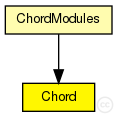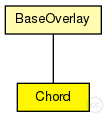 This documentation is released under the Creative Commons license
This documentation is released under the Creative Commons licenseThe main module of the Chord implementation
Author: Ingmar Baumgart, Markus Mauch

The following diagram shows usage relationships between types. Unresolved types are missing from the diagram. Click here to see the full picture.

The following diagram shows inheritance relationships for this type. Unresolved types are missing from the diagram. Click here to see the full picture.

| Name | Type | Description |
|---|---|---|
| BaseOverlay | simple module |
Base class for overlay implementations |
| Name | Type | Description |
|---|---|---|
| ChordModules | compound module |
Implementation of the Chord KBR overlay as described in "Chord: A Scalable Peer-to-Peer Lookup Protocol for Internet(1,2) Applications" by I. Stoica et al. published in Transactions on Networking. |
| Name | Type | Default value | Description |
|---|---|---|---|
| rpcUdpTimeout | double |
default timeout value for direct RPCs |
|
| rpcKeyTimeout | double |
default timeout value for routed RPCs |
|
| optimizeTimeouts | bool |
calculate timeouts from measured RTTs and network coordinates |
|
| rpcExponentialBackoff | bool |
if true, doubles the timeout for every retransmission |
|
| localPort | int |
UDP port for overlay messages |
|
| overlayId | int |
identifies the overlay this node belongs to (used for multiple overlays) |
|
| debugOutput | bool |
enable debug output |
|
| keyLength | int |
overlay key length in bits |
|
| nodeId | string |
optional nodeId as string in hexadecimal notation |
|
| useCommonAPIforward | bool |
enable CommonAPI forward() calls |
|
| drawOverlayTopology | bool |
draw arrow to successor node? |
|
| hopCountMax | int |
maximum number of overlay hops |
|
| recNumRedundantNodes | int |
numRedundantNodes for recursive routing |
|
| joinOnApplicationRequest | bool |
only join the overlay on application request |
|
| collectPerHopDelay | bool |
delay statistics for single hops |
|
| routeMsgAcks | bool |
use RPCs for route messages |
|
| lookupRedundantNodes | int |
number of next hops in each step |
|
| lookupParallelPaths | int |
number of parallel paths |
|
| lookupParallelRpcs | int |
number of nodes to ask in parallel |
|
| lookupVerifySiblings | bool |
true, if siblings need to be authenticated with a ping |
|
| lookupMajoritySiblings | bool |
true, if sibling candidates are selected by a majority decision if using parallel paths |
|
| lookupMerge | bool |
true, if parallel Rpc results should be merged |
|
| lookupFailedNodeRpcs | bool |
communicate failed nodes |
|
| lookupStrictParallelRpcs | bool |
limited the number of concurrent rpcs to parameter parallelRpcs |
|
| lookupUseAllParallelResponses | bool |
merge all parallel responses from earlier steps |
|
| lookupNewRpcOnEveryTimeout | bool |
send a new RPC immediately after an RPC timeouts |
|
| lookupNewRpcOnEveryResponse | bool |
send a new RPC after every response, even if there was no progress |
|
| lookupFinishOnFirstUnchanged | bool |
finish lookup, if the last pending RPC returned without progress |
|
| lookupVisitOnlyOnce | bool |
if true, the same node is never asked twice during a single lookup |
|
| lookupAcceptLateSiblings | bool |
if true, a FindNodeResponse with sibling flag set is always accepted, even if it is from a previous lookup step |
|
| routingType | string |
default routing mode (iterative, semi-recursive,...) |
|
| rejoinOnFailure | bool |
rejoin after loosing connection to the overlay? |
|
| sendRpcResponseToLastHop | bool |
needed by KBR protocols for NAT support |
|
| recordRoute | bool |
record visited hops on route |
|
| dropFindNodeAttack | bool |
if node is malicious, it tries a findNode attack |
|
| isSiblingAttack | bool |
if node is malicious, it tries a isSibling attack |
|
| invalidNodesAttack | bool |
if node is malicious, it tries a invalidNode attack |
|
| dropRouteMessageAttack | bool |
if node is malicious, it drops all received BaseRouteMessages |
|
| measureAuthBlock | bool |
if true, measure the overhead of signatures in rpc messages |
|
| restoreContext | bool |
if true, a node rejoins with its old nodeId and malicious state |
|
| successorListSize | int |
max number of successors in the SuccessorList |
|
| joinRetry | int |
after joinRetry unsuccessful join requests, we fetch a need bootstrap node from the GlobalNodeList |
|
| stabilizeRetry | int |
retries before a successor is considered failed |
|
| joinDelay | double |
delay between join retries (sec) |
|
| stabilizeDelay | double |
stabilize interval (sec) |
|
| fixfingersDelay | double |
fix_fingers interval (sec) |
|
| aggressiveJoinMode | bool |
use modified (faster) JOIN protocol |
|
| checkPredecessorDelay | double |
checkPredecessor interval (sec) |
|
| extendedFingerTable | bool |
use the extended finger table? |
|
| numFingerCandidates | int |
number of fingers when using extended finger table |
|
| proximityRouting | bool |
use proximity routing |
|
| memorizeFailedSuccessor | bool |
do not use failed sucessor again and inform new successor |
|
| mergeOptimizationL1 | bool |
enable merge optimization OPL1 |
|
| mergeOptimizationL2 | bool |
activate merge optimization OPL2 |
|
| mergeOptimizationL3 | bool |
activate merge optimization OPL3 |
|
| mergeOptimizationL4 | bool |
activate merge optimization OPL4 |
| Name | Value | Description |
|---|---|---|
| class | Chord | |
| display | i=block/circle |
| Name | Direction | Size | Description |
|---|---|---|---|
| udpIn | input |
gate from the UDP layer |
|
| udpOut | output |
gate to the UDP layer |
|
| tcpIn | input |
gate from the TCP layer |
|
| tcpOut | output |
gate to the TCP layer |
|
| appIn | input |
gate from the application |
|
| appOut | output |
gate to the application |
|
| direct_in | input |
gate for sendDirect |
// // The main module of the Chord implementation // // @author Ingmar Baumgart, Markus Mauch // simple Chord extends BaseOverlay { parameters: @class(Chord); volatile int successorListSize; // max number of successors in the SuccessorList // after joinRetry unsuccessful join requests, we fetch // a need bootstrap node from the GlobalNodeList int joinRetry; int stabilizeRetry; // retries before a successor is considered failed double joinDelay @unit(s); // delay between join retries (sec) double stabilizeDelay @unit(s); // stabilize interval (sec) double fixfingersDelay @unit(s); // fix_fingers interval (sec) bool aggressiveJoinMode; // use modified (faster) JOIN protocol double checkPredecessorDelay @unit(s); // checkPredecessor interval (sec) bool extendedFingerTable; // use the extended finger table? int numFingerCandidates; // number of fingers when using extended finger table bool proximityRouting; // use proximity routing // do not use failed sucessor again and inform new successor bool memorizeFailedSuccessor; bool mergeOptimizationL1; // enable merge optimization OPL1 bool mergeOptimizationL2; // activate merge optimization OPL2 bool mergeOptimizationL3; // activate merge optimization OPL3 bool mergeOptimizationL4; // activate merge optimization OPL4 }